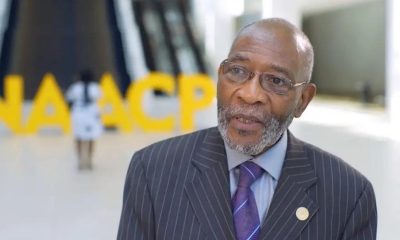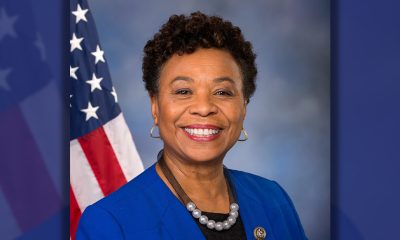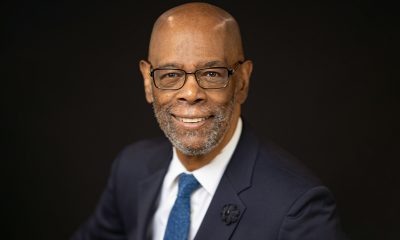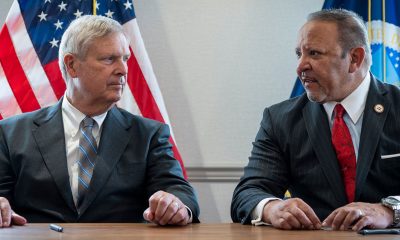Business
Wells Fargo Launches Banking Inclusion Initiative to Help Unbanked
African Americans, Latinos, Native Americans Get Access yo Low-Cost Banking
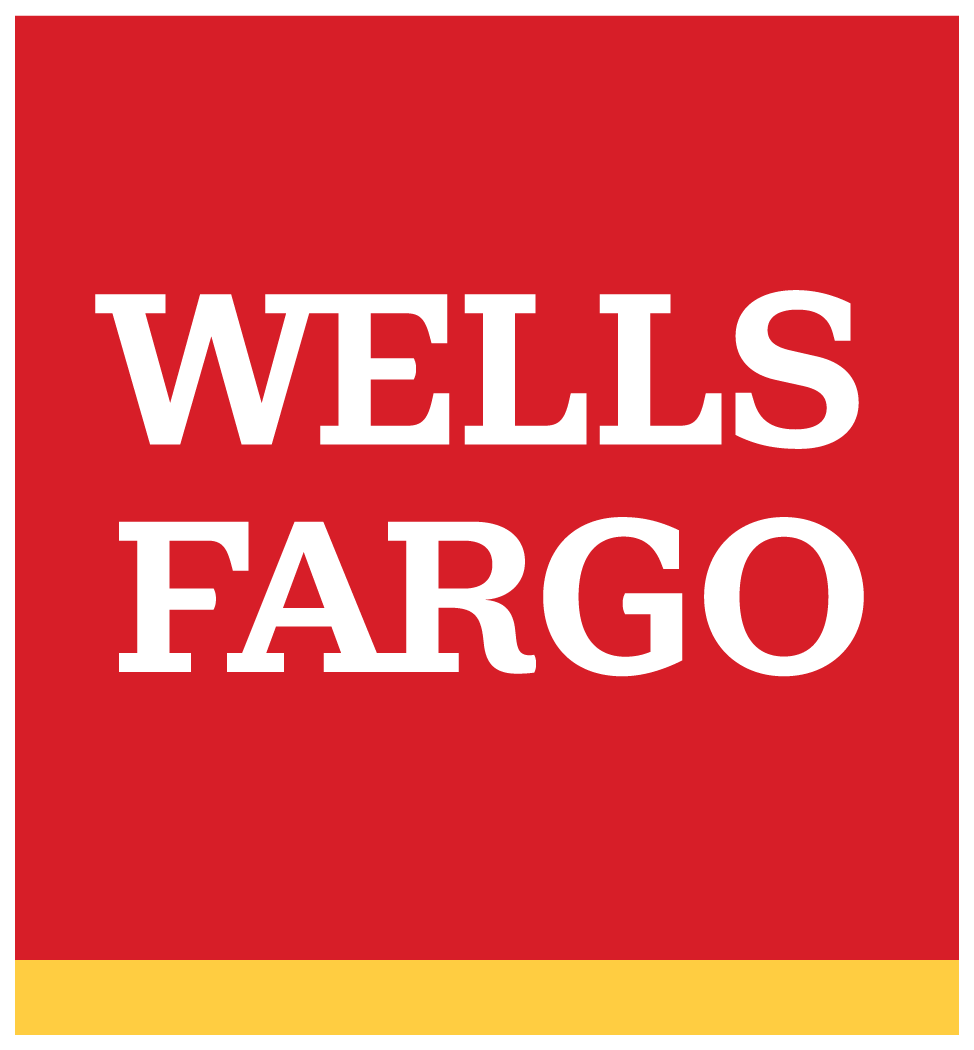
On Monday, Wells Fargo announced the Banking Inclusion Initiative, a 10-year commitment to help unbanked individuals gain access to affordable, mainstream, digitally-enabled transactional accounts – a meaningful entry point to fully participating in the economy and achieving financial stability.
The initiative will focus on reaching unbanked communities and, in particular, helping remove barriers to financial inclusion for Black and African American, Hispanic, and Native American/Alaska Native families, which account for more than half of America’s 7 million unbanked households1. It also will assist those who are underbanked or underserved – individuals who may have a bank account yet continue to use high cost, non-bank services and have similar needs.
Wells Fargo will bring together multiple national and community stakeholders to roll out the broad-based initiative that is designed to increase access to affordable products, digital banking and financial guidance within unbanked communities. Through this initiative, Wells Fargo also will collaborate with partners to explore solutions to the credit challenges facing unbanked individuals.
This year, the bank will work with partners to set and begin measuring a 10-year goal for reducing the number of people who are unbanked, with milestones along the way.
According to 2019 FDIC data1, 12.2 percent of Hispanic households, 13.8% of Black households, and 16.3% of American Indian/Alaska Native households in the U.S. don’t have access to a mainstream checking account – compared with 2.5% of white and 1.7% of Asian households.
The FDIC also reports that while these figures have been trending downward, the number of unbanked households will likely increase in the aftermath of the ongoing COVID-19 pandemic.
“We recognize the high number of unbanked households is a complex and long-standing issue that will require gathering the best minds, ideas, products and educational resources from across our communities to bring about change,” said CEO Charlie Scharf. “Through our Initiative, we will organize our resources under one umbrella and work with a broad and diverse group of stakeholders on a sustained multi-year effort to accelerate financial inclusion in the U.S.”
The commitment will be organized around three areas:
1. Access to Affordable Products and Digital Solutions
Wells Fargo will deepen its existing relationships with Black-owned Minority Depository Institutions (MDIs) to support their work in the communities they serve, including outreach efforts and providing the option for their customers to withdraw cash from Wells Fargo’s ATMs and incur no Wells Fargo fees. In addition, Wells Fargo is offering access to a dedicated relationship team that will work with each MDI on financial, technological and product development strategies to help strengthen and grow their institutions.
· In recognition that unbanked and underbanked individuals need access to short-term credit, Wells Fargo will increase funding and support to expand the Credit Builders Alliance (CBA) low-cost, credit-building consumer loan program. The organization’s CBA Fund will provide patient loan capital, capacity-building grants and technical assistance to their nonprofit lender members, enabling low-cost consumer loans for low- to moderate-income (LMI) individuals to meet short term cash needs and establish or improve their credit scores.
Wells Fargo will increase awareness and outreach about low-cost, no–overdraft fee accounts, such as Wells Fargo’s Bank On-certified Clear Access Banking.
· Wells Fargo will broaden its collaboration with CFE Fund and local Bank On coalitions to pilot new strategies and approaches that help overcome barriers to banking access in several markets with high concentrations of unbanked households. The program will focus on helping those who are unbanked navigate the financial system, develop an easier, more seamless path for them to open a Bank On-certified account and access services they need within mainstream banking. It will be used to identify best practices that can be applied on a national scale.
· Wells Fargo will work closely with Fintechs that are deeply committed to helping underserved communities. For instance, Wells Fargo is among the investors in Greenwood, a digital platform for Black and Latino individuals and business owners. The bank also has started a collaboration to help the Fintech MoCaFi provide banking to unbanked individuals, starting with offering MoCaFi customers the ability to use their MoCaFi debit card at Wells Fargo ATMs without incurring fees from Wells Fargo.
2. Financial Education and Advice
·
· Wells Fargo is working with the Historically Black Colleges and Universities (HBCUs) Community Development Action Coalition to launch Our Money Matters, a comprehensive financial wellness initiative for college students of color, who disproportionally face greater financial challenges and college debt. The initiative aims to equip students with much needed financial capability skills and access to support services. Over the next 3 years, the program will expand to 25 HBCUs and Minority Serving Institutions.
3. Launching National Advisory Task Force
· Recognizing the difficulty of addressing the unbanked issue in the U.S., Wells Fargo will establish and lead a broad coalition to help with this multi-year commitment. Wells Fargo is forming a National Unbanked Advisory Task Force that will work with the bank in developing solutions to bring more people into the banking system from underserved communities, while also providing feedback on the initiatives that will be implemented and helping determine the best ways to measure success. The task force will feature representatives from leading organizations, including LULAC (League of United Latin American Citizens), NAACP (National Association for the Advancement of Colored People), National Bankers Association, NCAI (National Congress of American Indians), UnidosUS, National Urban League, and Mississippi-based Hope Enterprise Corporation.
“With branches in more communities than any other financial institution, we believe we have a responsibility to do even more to help address this issue and the pandemic has increased the urgency,” said Mary Mack, CEO of Consumer and Small Business Banking at Wells Fargo. “It is why we’re launching this comprehensive initiative. It is our hope, working closely with our partners, we will be able to make a difference over time in addressing such a critical problem for our society.”
Edith Rocío Robles is an assistant vice president for Corporate Communications.
Activism
Oakland Post: Week of May 8 – 14, 2024
The printed Weekly Edition of the Oakland Post: Week of May May 8 – 14, 2024
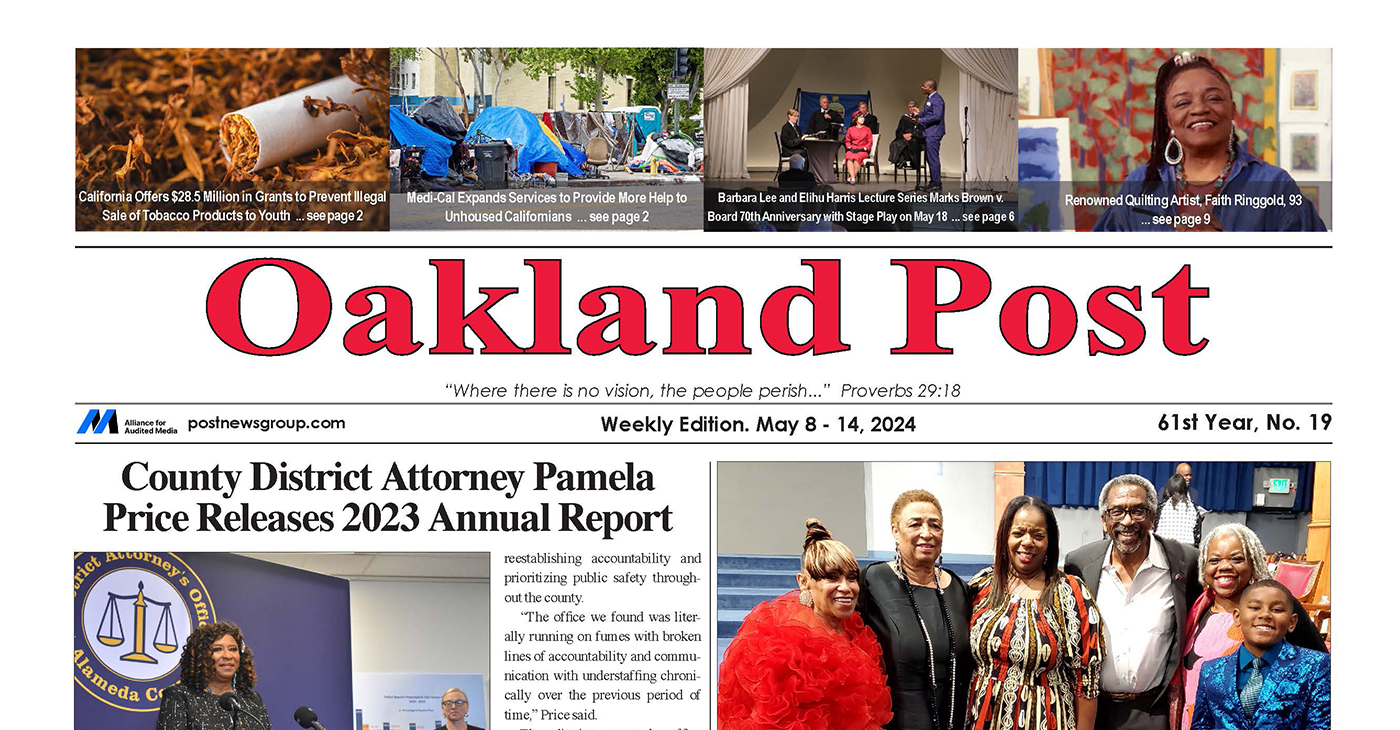
To enlarge your view of this issue, use the slider, magnifying glass icon or full page icon in the lower right corner of the browser window. ![]()
Bay Area
Mayor Breed Proposes Waiving City Fees for Night Markets, Block Parties, Farmers’ Markets, Other Outdoor Community Events
Mayor London N. Breed introduced legislation on April 26 to encourage and expand outdoor community events. The first will waive City fees for certain events, making them less costly to produce. The second will simplify the health permitting for special event food vendors through the creation of an annual permit. Both pieces of legislation are part of the Mayor’s broader initiative to bring vibrancy and entertainment to San Francisco’s public right of ways and spaces.

Mayor’s Press Office
Mayor London N. Breed introduced legislation on April 26 to encourage and expand outdoor community events.
The first will waive City fees for certain events, making them less costly to produce. The second will simplify the health permitting for special event food vendors through the creation of an annual permit. Both pieces of legislation are part of the Mayor’s broader initiative to bring vibrancy and entertainment to San Francisco’s public right of ways and spaces.
Outdoor community events are integral to San Francisco’s vibrant culture and sense of community. These events include night markets, neighborhood block parties and farmers markets, and bolster the City’s economy by supporting local businesses and attracting tourists eager to experience San Francisco’s unique charm and food scene.
They offer residents, workers and visitors, opportunities to engage with local artists, musicians, and food vendors while enjoying the San Francisco’s stunning outdoor spaces and commercial corridors.
The legislation will allow for more and new community gatherings and for local food vendors to benefit from the City’s revitalization.
“San Francisco is alive when our streets are filled with festivals, markets, and community events,” said Breed. “As a city we can cut fees and streamline rules so our communities can bring joy and excitement into our streets and help revitalize San Francisco.”
Fee Waiver Legislation
The events that can take advantage of the new fee waivers are those that are free and open to the public, occupy three or fewer city blocks, take place between 8 a.m. and 10 p.m., and have the appropriate permitting from the ISCOTT and the Entertainment Commission.
The applicant must be a San Francisco based non-profit, small business, Community Benefit District, Business Improvement District, or a neighborhood or merchant association. Fees eligible for waiver include any application, permit, and inspection/staffing fees from San Francisco Municipal Transportation Agency, Department of Public Health, Fire Department, Entertainment Commission, and Police Department.
Currently, it can cost roughly anywhere between $500-$10,000 to obtain permits for organized events or fairs, depending on its size and scope. Organizations and businesses are limited to a maximum of 12 events in one calendar year for which they can receive these fee waivers.
Food Vendor Streamlining Legislation
The second piece of legislation introduced will help special event food vendors easily participate in multiple events throughout the year with a new, cost-effective annual food permit. Food vendors who participate in multiple events at multiple locations throughout the year will no longer need to obtain a separate permit for each event. Instead, special event food vendors will be able to apply and pay for a single annual permit all at once.
“Many successful food businesses either begin as pop-up vendors or participate in special events to grow their business,” says Katy Tang, Director of the Office of Small Business. “Giving them the option for an annual special event food permit saves them time and money.”
Currently, food vendors are required to get a Temporary Food Facility (TFF) permit from the Department of Public Health (DPH) in order to participate in a special event, among permits from other departments.
Currently, each special event requires a new permit from DPH ranging from $124-$244, depending on the type of food being prepared and sold. Last year, DPH issued over 1,500 individual TFF permits. With the new annual permit, food vendors selling at more than four to six events each year will benefit from hundreds of dollars in savings and time saved from fewer bureaucratic processes.
“This legislation is a step in the right direction to make it easier for food vendors like me to participate in citywide events,” said Dontaye Ball, owner of Gumbo Social. “It saves on time, money and makes it more effective. It also creates a level of equity.”
Bay Area
Faces Around the Bay: Sidney Carey
Sidney Carey was born in Dallas, Texas. He moved with his family to West Oakland as a baby. His sister is deceased; one brother lives in Oakland. Carey was the Choir Director at Trinity Missionary Baptist Church for 18 years.
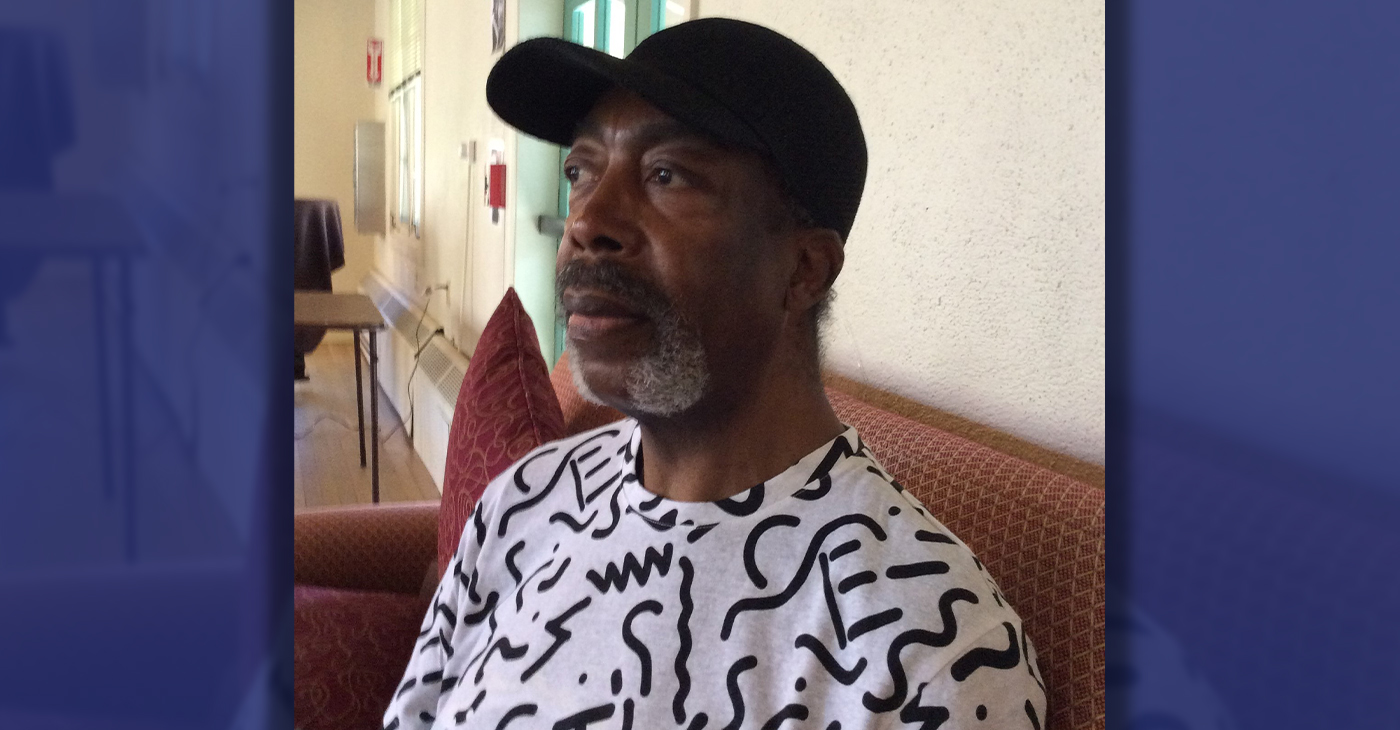
By Barbara Fluhrer
Sidney Carey was born in Dallas, Texas. He moved with his family to West Oakland as a baby. His sister is deceased; one brother lives in Oakland.
Carey was the Choir Director at Trinity Missionary Baptist Church for 18 years.
He graduated from McClymonds High with a scholarship in cosmetology and was the first African American to complete a nine-month course at the first Black Beauty School in Oakland: Charm Beauty College.
He earned his License, and then attended U.C., earning a secondary teaching credential. With his Instructors License, he went on to teach at Laney College, San Mateo College, Skyline and Universal Beauty College in Pinole, among others.
Carey was the first African American hair stylist at Joseph and I. Magnin department store in Oakland and in San Francisco, where he managed the hair stylist department, Shear Heaven.
In 2009, he quit teaching and was diagnosed with Congestive Heart Failure. He was 60 and “too old for a heart transplant”. His doctors at California Pacific Medical Center (CPMC) went to court and fought successfully for his right to receive a transplant. One day, he received a call from CPMC, “Be here in one hour.” He underwent a transplant with a heart from a 25-year- old man in Vienna, Austria
Two years later, Carey resumed teaching at Laney College, finally retiring in 2012.
Now, he’s slowed down and comfortable in a Senior Residence in Berkeley, but still manages to fit his 6/4” frame in his 2002 Toyota and drive to family gatherings in Oakland and San Leandro and an occasional Four Seasons Arts concert.
He does his own shopping and cooking and uses Para Transit to keep constant doctor appointments while keeping up with anti-rejection meds. He often travels with doctors as a model of a successful heart-transplant plant recipient: 14 years.
Carey says, “I’m blessed” and, to the youth, “Don’t give up on your dreams!”
-

 Community3 weeks ago
Community3 weeks agoFinancial Assistance Bill for Descendants of Enslaved Persons to Help Them Purchase, Own, or Maintain a Home
-

 City Government7 days ago
City Government7 days agoCourt Throws Out Law That Allowed Californians to Build Duplexes, Triplexes and RDUs on Their Properties
-

 Activism2 weeks ago
Activism2 weeks agoOakland Post: Week of April 24 – 30, 2024
-

 Business4 weeks ago
Business4 weeks agoV.P. Kamala Harris: Americans With Criminal Records Will Soon Be Eligible for SBA Loans
-

 Activism4 weeks ago
Activism4 weeks agoOakland Post: Week of April 10 – 16, 2024
-

 Community4 weeks ago
Community4 weeks agoAG Bonta Says Oakland School Leaders Should Comply with State Laws to Avoid ‘Disparate Harm’ When Closing or Merging Schools
-

 Community3 weeks ago
Community3 weeks agoRichmond Nonprofit Helps Ex-Felons Get Back on Their Feet
-

 Community3 weeks ago
Community3 weeks agoOakland WNBA Player to be Inducted Into Hall of Fame

